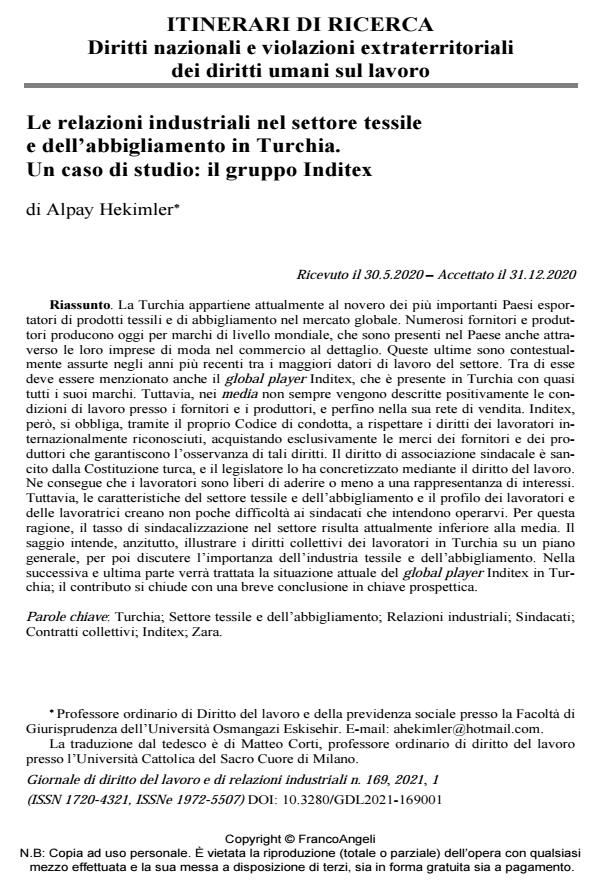Industrial relations in the textile and garment sector in Turkey. A case study: the Inditex Group
Journal title GIORNALE DI DIRITTO DEL LAVORO E DI RELAZIONI INDUSTRIALI
Author/s Alpay Hekimler
Publishing Year 2021 Issue 2021/169
Language Italian Pages 17 P. 1-17 File size 239 KB
DOI 10.3280/GDL2021-169001
DOI is like a bar code for intellectual property: to have more infomation
click here
Below, you can see the article first page
If you want to buy this article in PDF format, you can do it, following the instructions to buy download credits

FrancoAngeli is member of Publishers International Linking Association, Inc (PILA), a not-for-profit association which run the CrossRef service enabling links to and from online scholarly content.
Turkey is currently one of the most important export countries of textile and garment products in the global market. Nowadays, numerous suppliers and producers produce for international brands, which are also present in the Country also with their retail companies. In the recent years, the latest have also became among the main employers of the sector. Among them there is the global player Inditex, which is present in Turkey with nearly all its brands. Nevertheless, the media rarely describe positively the labour conditions in the suppliers’ and producers’ companies and even in the retail chain. However, Inditex committed, in its Code of conducts, to respect international labour rights, by purchasing exclusively from suppliers and producers that guarantee those rights. The right to form and join a union is guaranteed by the Turkish Constitution and the legislator has concretized it in the Labour law. It follows that workers are free to join or not join a trade union. However, the features of the textile and garment sector and the workers’ profile create a number of difficulties to trade unionists who wish to operate in the sector. For this reason, the degree of unionization in the sector is currently lower than the average. The essay aims, first of all, to broadly illustrate the collective labour rights in Tur-key, second it discusses the importance of the textile and garment sector in Turkey. In the next and last section, the actual situation of the global player Inditex in Turekey. The contribution ends with a short forward looking conclusion.
Keywords: Turkey; Textile and garment sector; Industrial relations; Trade unions; Collective agreements; Inditex; Zara
Alpay Hekimler, Le relazioni industriali nel settore tessile e dell’abbigliamento in Turchia. Un caso di studio: il gruppo Inditex in "GIORNALE DI DIRITTO DEL LAVORO E DI RELAZIONI INDUSTRIALI " 169/2021, pp 1-17, DOI: 10.3280/GDL2021-169001